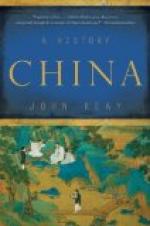Gentry society continued from Kao Tsu’s time to 1948, but it went through a number of phases of development and changed considerably in time. We will later outline some of the most important changes. In general the number of politically leading gentry families was around one hundred (texts often speak of “the hundred families” in this time) and they were concentrated in the capital; the most important home seats of these families in Han time were close to the capital and east of it or in the plains of eastern China, at that time the main centre of grain production.
We regard roughly the first one thousand years of “Gentry Society” as the period of the Chinese “Middle Ages”, beginning with the Han dynasty; the preceding time of the Ch’in was considered as a period of transition, a time in which the feudal period of “Antiquity” came to a formal end and a new organization of society began to become visible. Even those authors who do not accept a sociological classification of periods and many authors who use Marxist categories, believe that with Ch’in and Han a new era in Chinese history began.
2 Situation of the Hsiung-nu empire; its relation to the Han empire. Incorporation of South China
In the time of the Ch’in dynasty there had already come into unpleasant prominence north of the Chinese frontier the tribal union, then relatively small, of the Hsiung-nu. Since then, the Hsiung-nu empire had destroyed the federation of the Yueeh-chih tribes (some of which seem to have been of Indo-European language stock) and incorporated their people into their own federation; they had conquered also the less well organized eastern pastoral tribes, the Tung-hu and thus had become a formidable power. Everything goes to show that it had close relations with the territories of northern China. Many Chinese seem to have migrated to the Hsiung-nu empire, where they were welcome as artisans and probably also as farmers; but above all they were needed for the staffing of a new state administration. The scriveners in the newly introduced state secretariat were Chinese and wrote Chinese, for at that time the Hsiung-nu apparently had no written language. There were Chinese serving as administrators and court officials, and even as instructors in the army administration, teaching the art of warfare against non-nomads. But what was the purpose of all this? Mao Tun, the second ruler of the Hsiung-nu, and his first successors undoubtedly intended ultimately to conquer China, exactly as many other northern peoples after them planned to do, and a few of them did. The main purpose of this was always to bring large numbers of peasants under the rule of the nomad rulers and so to solve, once for all, the problem of the provision of additional winter food. Everything that was needed, and everything that seemed to be worth trying to get as they grew more civilized, would thus be obtained better and more regularly than by raids or




